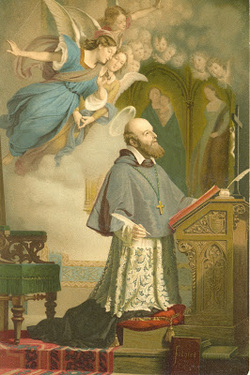
of perpetual chastity, putting himself under the special patronage of the Blessed Virgin. God to purify his heart permitted a dense darkness to overspread his mind, and a spiritual dryness and melancholy to overwhelm him. He seemed, from a perfect tranquillity and peace of mind, to be almost brought to the brink of despair. Seized with
the greatest terror, he passed days and nights in tears and lamentations, and suffered more than can be conceived by those who have never felt the severity of such interior conflicts. His pious preceptor endeavored in vain to discover the cause of these troubles, and to suggest a remedy. At last Francis, being at prayer in the same church of St. Stephen, cast his eyes on a picture of our Blessed Lady, and, prostrating himself on the ground as unworthy to address the Father of all consolation, he begged that she would be his advocate, and procure him the grace to love God with his whole heart. That very moment he found himself eased of his grief as of a heavy weight taken from his heart, and his former peace and tranquillity restored, which he ever after enjoyed. He was eighteen years old when his father recalled him from Paris, and sent him to Padua to study law; here two years later he received the degrees of doctor with great applause and pomp, in the presence of forty-eight doctors. His father wished him to form a very favorable alliance, and obtained in his behalf from the duke of Savoy, documents creating him councellor of the parliament of Chamberry. Francis modestly, but firmly, refused both; yet dared not propose to his parents his design of receiving holy orders. He had recourse to his cousin, Lewis of Sales, a priest and canon of Geneva,
who obtained the consent of his parents, but not without the greatest difficulty. He was appointed by the Pope to the provostship of the Church of Geneva, then vacant. He delivered the word of God with a mixture of majesty and modesty; his first sermons gained him an extraordinary reputation, and were accompanied with incredible success. His piety, his charity to the poor, his disinterestedness, his care of the sick and those in prison, endeared him to all.
He was naturally of a hasty and passionate temper, but by studying in the school of a God who was meek and humble of heart, he learned that important lesson to such perfection, as to convert his predominant passion into his characteristical virtue. The Calvinists ascribed principally to his meekness the wonderful conversions he made amongst them. St. Francis converted no less than seventy-two thousand of them. In 1599 he was raised to the episcopate of Geneva. Immediately after his consecration he performed the visitation of his diocese, reformed several monasteries and corrected many abuses. St. Francis instituted the Order of the Visitation, designing it to be such, that all, even the sickly and weak might be admitted into it. Humility, piety, charity, meekness and simplicity were to be the necessary requirements of its members.
In the year 1622 having received an 'order from the duke of Savoy to confer at Avignon with Louis XIII. who had just finished the civil wars in Langnedoc, he took leave of his friends, saying he should never see them again. He was received by the king, queen-mother, and all the princes at Avignon with the greatest marks of honor and esteem. Though indisposed he performed all his functions on Christmas-day and St. John's in the morning. After dinner he began to fall gradually into apoplexy and happily expired on the 28th of December, in the year 1622, the fifty-sixth of his age, and the twentieth of his episcopacy. His body was embalmed and laid near the high altar in the church of the monastery of the visitation at Annecy. Innumerable miracles have been wrought by
his intercession.
The spirit of ardor, authority, sagacity and power to lead, with a strong love for his crucified Lord, are the chief characteristics of St. Francis. In him as in St. Paul, we see untiring activity, burning zeal and wonderful tact, eloquence and defiance of opposition and persecution, and like this great apostle he became all to all for the salvation of souls. To St. Francis was given the peculiar commission of making felt the sweetness of charity, and leading men to salvation by this path, rather than by that of austerity and penance.
PRAYER OF THE CHURCH. O God, who didst wish blessed Francis, Thy confessor and bishop, to become all things to all for the salvation of souls : grant propitiously that, imbued with the sweetness of Thy charity, we may, directed by his counsels and aided by his merits, attain eternal joys. Thro'. &c.
- Goffine's Devout Instruction, Imprimatur 1880 -
A Coloring page of St. Francis deSales can be found here.


 RSS Feed
RSS Feed